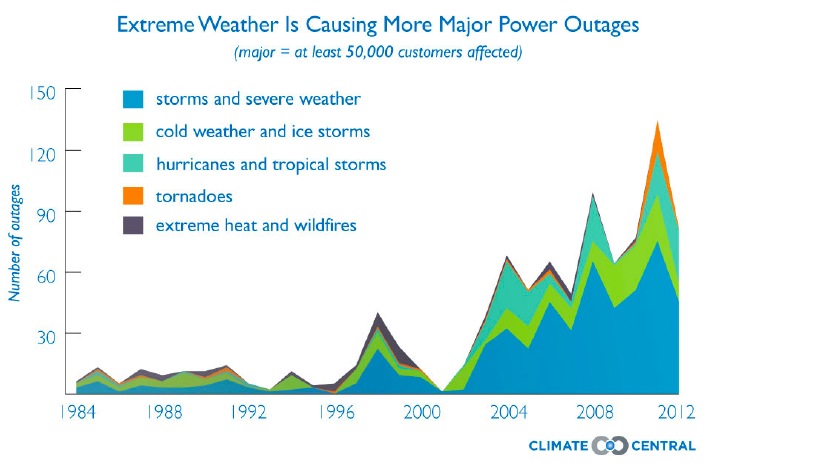CLIMATE CENTRAL
Summary
Climate change is causing an increase in many types of extreme weather. Heat waves are hotter, heavy rain events are heavier, and winter storms have increased in both frequency and intensity. To date, these kinds of severe weather are among the leading causes of large-scale power outages in the United States. Climate change will increase the risk of more violent weather and more frequent damage to our electrical system, affecting hundreds of millions of people, and costing Americans and the economy tens of billions of dollars each year.
Climate Central’s analysis of 28 years of power outage data, supplied to the federal government and the North American Electric Reliability Corporation by utilities, shows:
- A tenfold increase in major power outages (those affecting more than 50,000 customer homes or businesses), between the mid-1980s and 2012. Some of the increase was driven by improved reporting. Yet even since 2003, after stricter reporting requirements were widely implemented, the average annual number of weather-related power outages doubled. Non-weather related outages also increased during that time, but weather caused 80 percent of all outages between 2003-2012.
- Michigan led all states with 71 major weather-related power outages between 2003 and 2012, averaging at least 800,000 customers affected each year during that decade. Texas ranked second with 57 outages and also averaged more than 800,000 customers affected annually. Ohio was third with 54, followed by Pennsylvania and Virginia with 52. The number of customers affected could not be estimated for these three states.
- 147 million customers lost power, for at least an hour and often far longer, from weather-related outages since 2003, an average of 15 million customers affected each year. Currently, there are 145 million customers in the U.S. A customer is a home or a business, or anyone who receives a bill from a utility, so the number of people affected by outages is likely much higher, from 300 million to perhaps half a billion or more over the decade analyzed.
- 59 percent of weather-related outages analyzed were caused by storms and severe weather; nearly 19 percent by cold weather and ice storms; 18 percent by hurricanes and tropical storms; 3 percent tornadoes, and 2 percent by a combination of extreme heat events and wildfires.
Most of these outages come from damage to large transmission lines or substations, as opposed to the smaller residential distribution network.
Climate change is a threat multiplier. Major weather-related outages cost Americans between $20 and $55 billion annually according to recent estimates. Lack of preparedness for increasingly extreme weather puts people, infrastructure and the economy at growing risk. There is broad agreement with “very high confidence” that climate change-related extreme weather events damage critical infrastructure, disrupt the food supply, threaten water supplies and increase mortality worldwide (IPCC 2014).
Even in cases where the link to climate change is not well understood, extreme weather appears to be becoming more severe, as the case with hurricanes and thunderstorms. While only two Category 4 or 5 hurricanes have made U.S. landfall since 1990, average hurricane strength and the total number of Category 4 and 5 hurricanes is increasing. And while the trend in the incidence of severe thunderstorms is unknown due to lack of comprehensive monitoring, insurance companies are now paying out at least seven times more for thunderstorm damages than in the 1980s.
Climate change is, at most, partially responsible for this recent increase in major power outages, which is a product of an aging grid serving greater electricity demand, and an increase in storms and extreme weather events that damage this system. But a warming planet provides more fuel for increasingly intense and violent storms, heat waves, and wildfires, which in turn will continue to strain, and too often breach, our highly vulnerable electrical infrastructure.
Download full version (PDF): Extreme Weather, Climate Change and Power Outages
About Climate Central
www.climatecentral.org
Climate Central surveys and conducts scientific research on climate change and informs the public of key findings. Our scientists publish and our journalists report on climate science, energy, sea level rise, wildfires, drought, and related topics. Climate Central is not an advocacy organization. We do not lobby, and we do not support any specific legislation, policy or bill. Climate Central is a qualified 501(c)3 tax-exempt organization.
Tags: Climate Central, extreme weather







 RSS Feed
RSS Feed